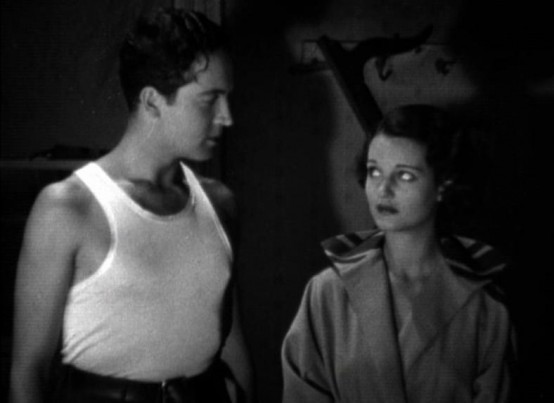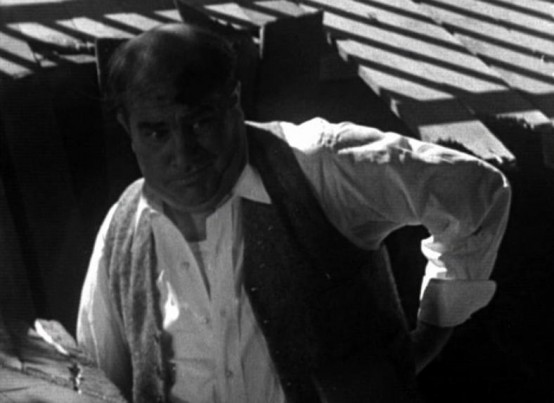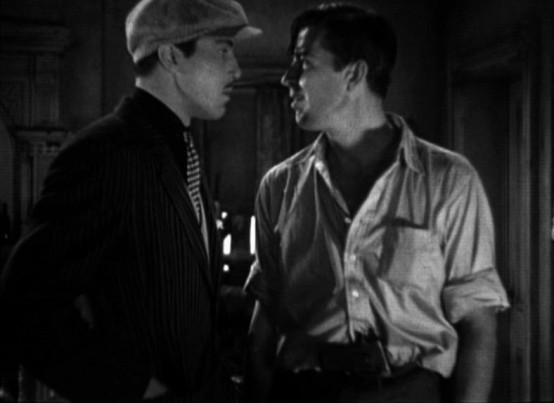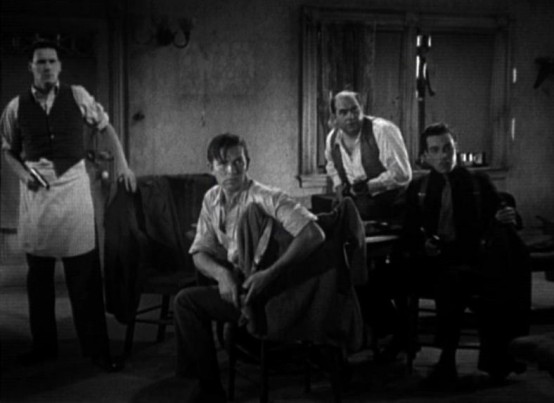 Kubec Glasmon was one-half of the team who wrote Beer and Blood, the story that Warner Bros. turned into The Public Enemy (1931) on Darryl F. Zanuck’s watch as producer. Shortly after the real-life Weyerhaeuser kidnapping dominated newspaper headlines during May-June 1935, Zanuck bought Glasmon’s story Snatched to produce at Twentieth Century Pictures. The Production Code Administration rejected the title and PCA head Joseph Breen warned Zanuck that kidnapping stories were no longer acceptable on the screen. Not a problem. We never see the gang’s kidnap victim in what became Show Them No Mercy, only delivery of their ransom note. We don’t even meet the kidnappers until after their hostage is set free and they return to their hideout with their ransom fee. Show Them No Mercy isn’t a movie about a kidnapping, it’s a movie about the kidnappers.
Kubec Glasmon was one-half of the team who wrote Beer and Blood, the story that Warner Bros. turned into The Public Enemy (1931) on Darryl F. Zanuck’s watch as producer. Shortly after the real-life Weyerhaeuser kidnapping dominated newspaper headlines during May-June 1935, Zanuck bought Glasmon’s story Snatched to produce at Twentieth Century Pictures. The Production Code Administration rejected the title and PCA head Joseph Breen warned Zanuck that kidnapping stories were no longer acceptable on the screen. Not a problem. We never see the gang’s kidnap victim in what became Show Them No Mercy, only delivery of their ransom note. We don’t even meet the kidnappers until after their hostage is set free and they return to their hideout with their ransom fee. Show Them No Mercy isn’t a movie about a kidnapping, it’s a movie about the kidnappers.
When the kidnappers arrive at the hideout their victim has already been swapped out for a case full of money, but Show Them No Mercy still puts innocence at stake inside this seemingly abandoned house.
An idealistic young couple, Joe and Loretta Martin (Edward Norris and Rochelle Hudson), get lost on a dark and stormy night. After a bit of calm, playful quibbling passes between the couple, enough rain has fallen to sink their car into the mud. Luckily there’s an old dark house in the distance and Joe and Loretta, along with their small baby and peppy little dog, are able to take shelter for the night. The house seems long abandoned, but Joe notices yesterday’s date on the newspaper he uses to light a fire. Loretta finds a pantry overflowing with groceries when Joe heads out into the rain to retrieve their luggage.
“And I didn’t even need to climb down the chimney,” Joe says, joking about their good fortune.
“Let’s hope we don’t have to get out that way,” says Loretta, never dreaming that she’d soon wish they could.
The Martins turn in after eating, but no sooner does Joe get under the covers than Sport, the family dog, starts to growl. Joe goes to the window where his gaze is met by approaching headlights. In a few moments the door opens and the men who were about to enter just as quickly back away. They enter again, slowly, this time with weapons drawn.
“Don’t monkey around, let ‘em have it,” the one called Pitch (Bruce Cabot) says. He’s not a nice man.
The leader of the pack, a fellow named Tobey (Cesar Romero) tries to calm the situation. Joe and Loretta are all smiles, sugary sweet, as they explain how their car broke down on the way to a job opportunity for Joe in San Diego. Tobey tells them they can stay the night.
“You won’t have any trouble from us,” Joe says.
“You’re telling me,” Tobey replies. He smirks as he shuts them into a room and locks the door.
In the main room of the house Buzz (Edward Brophy) turns up the radio so the family can’t overhear them. The case is opened and $200,000 in cash stares back at the four men. Tobey takes a magnifying lens from Gimp (Warren Hymer) and inspects the bills for any signs of tampering. He seems satisfied with what he sees.
The song on the radio ends and the announcer breaks through with a report about the kidnappers, mentioning how their captive was returned safely in exchange for the ransom money. Buzz lunges towards the radio and shuts it off, but this annoys Tobey.
“They don’t have to guess who we are now,” he says.
While the movie gives us the young couple to root for, they’re hollow characters meant to satisfy the censors more than the viewers. They’re good, normal kids, who wind up being held against their will, and if that isn’t enough for you, they’ve got a baby, and she’s sick.
Show Them No Mercy is all about the kidnappers, especially Tobey and Pitch, and how they react towards one another and their captives. Pitch (Cabot) wants to rub out the wholesome young family from the moment they arrive. He’s more insistent after he begins working on a couple of bottles of booze. Buzz (Brophy), who takes every spare moment to make sure his cut of the money is still under his pillow, tends to side with Pitch on this matter. Tobey (Romero) is the most level-headed of the bunch, the agreed upon leader of this gang, and smart enough to know that murder is neither necessary nor desirable. He tolerates the Martins, but also realizes they may have a use. Or they could possibly outlive any usefulness. Gimp (Hymer) is a little dopey, but the most charitably inclined of the group. He expresses sympathy for the infant throughout their time together and he eventually takes the step of hiding the key to the room from Pitch, who’s then drunk and threatening to kill the family.
Other than their unexpected visitors, the kidnappers are optimistic that they’ve pulled off the perfect crime. Tobey forces Joe to drive him into a few local towns to pass some of the ransom bills. The boys are all in high spirits after he returns with news that the money is good. That is, until the radio lets them in on what “G” Man Reed (Frank Conroy) has just explained to his agents in a previous scene.
The ransom notes were unmarked, but the Bureau of Investigation has supplied them with serially numbered and lettered bills that are easy to track (details in following image). The moment Tobey had Joe begin distributing cash was the moment the Federal government had their first clue of where the kidnappers were hiding out.
By this point the Martin family realize that their time is running out. When Joe pries a knot of wood out of a floorboard he discovers that there’s a basement below them. Loretta gives him her scissors and he begins carving around the edge of the knothole, hoping to create an escape route through the floor, into the basement, and beyond. Joe’s chore adds to the suspense, but never amounts to a hole that he can fit much more than his arm through.
The captive couple, played by Edward Norris and Rochelle Hudson, are not interesting enough to become attached to. They’re too likeable. Unreal. Norris has a few moments with each Romero and Cabot where he almost seems like flesh and blood, and Hudson gets to make one threatening speech before being handed the wildest scene of the entire movie, but their characters are too isolated from the action to ever feel like more than representative victims. This actually works in the story’s favor, putting almost all of the attention on the four criminals.
As Gimp, Warren Hymer threatens his usual idiot act, but reels it in some to become the most human of the four kidnappers. On his own and on the run he’s even somewhat shrewd as he turns his bad money into clean cash before running into a bit of bad luck that causes his downfall. The most one dimensional of the criminal group turns out to be Edward Brophy’s character, though it’s not his fault that the script saddled Brophy with most of the pratfalls and a woodpecker obsession that begins to wear on our nerves as much as his.
Bruce Cabot is scary from the start and all you need to do is add liquor to make him even more terrifying. He’s aching to rub out the Martin family from the first moment he sees them, and that includes little baby Martin.
Bothered by the sick child’s crying from the other room, Cabot’s Pitch tells Gimp, “Go in there and throw a blanket over his head or something.”
“Gee, that would smother him!”
“Naw,” Pitch says, his tone making clear that was his exact intention.
Pitch is the worst of a bad bunch by far. Despite being best known for his romantic leading man in King Kong (1933), Cabot is an actor I always associate with villainy, and it’s his expert handling of roles like Pitch that make that so.
Even though he’s second billed in a criminal role, Cesar Romero is really the star attraction of Show Them No Mercy. His Tobey is smart enough to lead this band and brawny enough to make us believe he can keep Cabot’s Pitch in check, at least most of the time. Whereas Pitch has no redeeming qualities, Romero’s Tobey is a slightly softer touch. There’s little doubt that he’d take the lives of the Martins if need be, but he considers murder bad business. He understands the family have innocently stumbled into a bad situation, whereas Pitch blames the Martins for putting themselves in his way.
By no means does Tobey wear a white hat, or even a gray one, but he’s a character whose qualities grow on you. He’s the most principled of an unprincipled group. You can see it after all of their plans of gone haywire and he assures Pitch that he’ll get his cut in the end because, he adds almost offhandedly, “You know me.” The line confirms his square underworld reputation. You don’t want to see Tobey come out on top at the end of all of this, but he’s a character you can hope does the right thing. Just don’t hope too hard.
Show Them No Mercy speeds along, its pace aided by the building blocks at the front of the story, each almost totally discarded in favor of what follows. At the open the movie seems as though it’s going stick with the wealthy family of the kidnapping victim. But they’re unimportant. Then the action is handed off to the Martin family, who seem as though they are intended to be the main subjects of the film. But they’re not. The movie doesn’t really get going until the four criminals make their entrance, and once they do, you forget all about what came before them.
Director George Marshall then stages something resembling The Petrified Forest, which had been a Broadway smash earlier that year. Each of the criminal characters is interesting enough in his own way to allow us to forgive the Martins for being so plastic.
“They’re fighting among themselves,” Loretta says after listening at the door.
It was bound to happen, yet their dissension adds new layers to Show Them No Mercy. The four crooks had been banded against Norris and Hudson, but now it’s every man for himself. This leads to an exciting blood-soaked conclusion. Everybody gets what’s coming to them by the end, right on down to the recipient of the Latham Foundation Medal for Heroism and Bravery.
Show Them No Mercy was remade at Fox as the 1951 western Rawhide, directed by Henry Hathaway. The parts of the captives were built up and played by top stars Tyrone Power and Susan Hayward. Hugh Marlowe leads the band of four desperadoes who keep Power and Hayward under their thumbs while awaiting arrival of a stagecoach carrying gold. The characters are more realized in the remake, though the situation itself is more tense throughout the earlier film. While the remake boasts star power in more traditional leading roles, this Western version of the story doesn’t include the ransom money, which is primary motivation for the behavior of the criminals in the earlier movie. For me Rawhide was enjoyable, but not quite as interesting as Show Them No Mercy.
Show Them No Mercy is available as a manufactured-on-demand DVD-R from Twentieth Century Fox as part of their Cinema Archives collection. Pick it up on Amazon HERE. Rawhide is one of three films in Fox’s 2008 DVD set, Fox Western Classics
, which also includes The Gunfighter (1951) and Garden of Evil (1954).














Hi Cliff, Just saw enough of this to interest me. Then saw Bruce Cabot in 1935. Didn’t read all…..don’t want to spoil it, but great article…..you hooked me! Have a good one………KEITH
Thanks, Keith, I know how you feel, I have a ton of articles to read that I’m “saving” for later myself!
Like you, I associate Bruce Cabot with villains. His “Magua” has haunted me since childhood.
I didn’t realize “Rawhide” had roots that reached back to this earlier film. Darn my completist soul!
Bruce can be so nasty! That said, I’ve found him pretty effective as a romantic leading man in non-Kong pre-Codes too. Problem is, I can never trust him!
Definitely worthwhile to compare the two, which are each very good in their own right. I prefer this version of the story, but then, I’m going to lean towards a ’30s gangster flick over a ’50s Western almost every time.